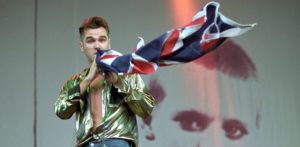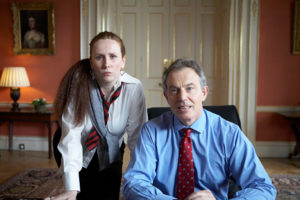What do John Major, Tony Blair and Ken Livingstone have in common? Obviously, they’re politicians who are now some way past their vote-by date, but more than that, they all have music-hall blood running through their veins. Major’s parents, Blair’s paternal grandparents and Livingstone’s mother were all performers on the variety stage. And that seems right. Where the politics of America is shaped by Hollywood — sometimes, as with Ronald Reagan and Arnold Schwarzenegger, sharing the same cast list — that of Britain surely draws on the grubby, glitzy world of the music halls.
Music hall grew out of pubs in the mid-19th century and reached its peak in the 1890s, the most popular form of entertainment in the country. It provided a full evening’s show of short unrelated acts, including singers, comics, acrobats, jugglers, dancers, eccentric dancers, trick cyclists, drag performers, animal acts, and any permutations of the above. It was like Britain’s Got Talent. With talent.
Older viewers may also remember The Good Old Days, a stalwart of BBC television for 30 years, up to 1983, with contemporary TV stars reviving old material in front of an audience dressed up in Edwardian outfits. That was a heavily sanitised version. The original halls were raucous, boozy venues, with crowds who weren’t reticent in expressing their opinion of the performers verbally and even physically. These stages were no place for the faint-hearted. Nor for the understated: there was no amplification to help in projecting across the pit-band, through a dense fog of pipe and cigar smoke, to a couple of thousand drunken patrons. Towards the back of the hall, prostitutes plied — and sometimes practised — their trade. And then, right at the back, was the bar, from where the waiters emerged to provide table service, sometimes with the bottles chained to the trays, to prevent them being seized and used as weapons. If you could make it here, you could make it anywhere.
Unsurprisingly, all this met with extreme disfavour in polite society. It was coarse, vulgar and degrading. First, the entertainment onstage was disgraceful. When the can-can arrived from Paris in the late 1860s, it was so scandalous that the Alhambra in Leicester Square and the Highbury Barn in North London both had their licences suspended for staging what The Times called “this daring outrage on public decency”.
The behaviour offstage was equally reprehensible. In 1894 the London County Council (LCC) insisted that screens be erected at the back of the hall in the Empire in Leicester Square so that decent-minded punters might be shielded from the prostitution. That didn’t work, though; on the first night, the screens were torn down by a group of young hearties, led by a Sandhurst cadet. “Ladies of the Empire, I stand for Liberty!” declared Winston Churchill (for it was he), in what he described as his “maiden speech”.
The fact that it was the Empire that was being targeted by moral campaigners was revealing. There were working-class halls in the East End of London where immorality, and even obscenity, was far more prevalent, but the great fear was that the corruption was seeping out, infecting those places frequented by wealthy young men — in the same way that, a century later, the moral panic over gangsta rap was prompted by its spread beyond the black ghettos where it had originated.
It wasn’t just the Right-wing moralists who objected to the music hall. In 1907 the LCC voted to ban from London stages the tableau vivant. This was an act in which a woman wearing a sheer, close-fit bodystocking (“so nearly naked that you can’t tell the difference”, according to the papers) struck poses based on classical statues. And it was noticeable that most of those voting for the ban were sober-minded Liberals, while all but two of the 43 who voted against were fun-loving Conservatives.
Liberals objected to music hall partly on moral grounds and partly on cultural: all that drinking didn’t go down well with the nonconformist rank and file, who had a leaning towards teetotalism. But there were also political problems. Particularly suspect was the intense patriotism of the halls, shading into jingoism. Indeed the word “jingoism” itself came from music hall, from a bellicose song performed by the Great MacDermott in 1878, when conflict with Russia seemed imminent: “We don’t want to fight, but by jingo if we do / We’ve got the ships, we’ve got the men, and got the money too!”
The Boer War brought that tendency to the fore. The message coming from the stage was encapsulated in the song “Stand by Your Country, Stand by Your Queen”, while the Boers were promised there’d be “A Hot Time in the Transvaal Tonight”. Decent-minded folk were quick to condemn politicians who exploited such “music-hall jingoism”, and chief among the alleged offenders was the Colonial Secretary, Joseph Chamberlain. Formerly on the radical wing of the Liberal Party, now serving under a Conservative prime minister, he was a populist figure for whom politics was a question of drawing dividing lines. “A seat lost to the government is a seat won by the Boers,” he declared during the Khaki Election of 1900.
Three years later, Chamberlain left the Cabinet to campaign for the policy of imposing tariffs on goods imported into the Empire — imperial preference, as it was called, one of the regular occasions on which the Conservatives have torn themselves apart over the question of free trade. In that campaign, he allocated a substantial budget to getting the issue raised in music halls and related arenas. It was said that at the Christmas of 1903, more than 200 pantomimes featured a pro-tariff song such as “The John Bull Store” and “Good Old Joe”, the majority of them paid for by Chamberlain. He was the first British politician to recognise the power of popular culture, and his patriotic arguments — as broad-brush as any comic of the time — got a good reception. Possibly, though, he was too far ahead of the game: barely half of adult males had the vote, and the predominantly working-class audiences in the halls were disproportionately disenfranchised.
They remained, though, stubbornly patriotic. And stubbornly attached to the Tory cause. There were songs that grudgingly gave Asquith and Lloyd George credit for introducing pensions, but the latter’s supposed weakening of ale during the First World War couldn’t be countenanced. “At the brewery, there’s nothing doing; all the water works are brewing Lloyd George’s Beer,” sang Ernie Mayne mournfully, and he concluded: “The worst thing that ever happened in this war is Lloyd George’s Beer.” Come the National Government of the early Thirties, when ex-Labour leader Ramsay MacDonald fronted a Tory-led coalition, it was Stanley Holloway, king of the music-hall monologue, who provided the most vocal endorsement: “No government ever was perfect, but the National’s the best in the land, so let them as thinks they’d do better, stop grousing and lend them a hand.”
By then, though, the music hall was on its last legs. The rise of cinema, radio and paperback fiction had already dismantled its cultural dominance, and television and rock ‘n’ roll were shortly to deliver the final blow. Though it survived in the working men’s clubs, those were far from the centres of media power and consequently attracted little attention.
Beyond that, the cultural memory began to fragment. Yet there were occasional sightings, even in the world of politics, and especially in the Labour Party. When James Callaghan, born in 1912, wanted to address media speculation about an early election in the autumn of 1978, he choose to do so by singing Vesta Victoria’s music-hall classic “Waiting at the Church” to the TUC Congress. (He misattributed it to Marie Lloyd, whose song “A Little of What You Fancy” had been used by Harold Macmillan 20 years earlier to sell the introduction of Premium Bonds.)
And when Michael Foot, born in 1913, wanted to mock the Conservative government in 1980, he told a long, rambling story about visiting the Palace Theatre of Varieties in Plymouth as a child. One of his favourite acts, he said, was a stage magician, who would take a watch from an audience member, “enfold it in a beautiful red handkerchief, place it on the table in front of us, take out his mallet, hit the watch and smash it to smithereens”. Then a look of utter bewilderment would descend on his face, as he was obliged to admit: “I am very sorry. I have forgotten the rest of the trick.” And this, Foot suggested, was precisely the same look that could be seen on the face of Keith Joseph, the Industry Secretary, as he surveyed the wreckage of the British economy in the midst of the first Thatcherite recession.
Then the Labour Party decided to skip a generation, and elected as leader Neil Kinnock, an honorary member, and sometime Vice President, of the Gene Vincent Appreciation Society. As in real life, rock ‘n’ roll seemed to have displaced music hall. In both cases, though, that wasn’t the whole story. “Bryan [Ferry] and I always joked about the fact that rock and roll was basically music hall,” said Andy Mackay of glam-rock group Roxy Music, and that trio of figures with whom we started suggest that the same is true of politics.
The ability to play a crowd at a rally, or in the bearpit that used to be the Labour conference, has become much less important, but the House of Commons remains a tough gig. “Prime Minister’s Questions often resembled my father’s description of a raucous night at the Glasgow Empire,” observed John Major. And even though he himself wasn’t particularly good at PMQs, nor at delivering big speeches, it was striking that his finest moment came in the 1992 general election; standing on a soapbox in town squares and market-places, facing down hostile crowds and demonstrators, he looked surprisingly at home. “I often reflected that my chosen career was akin to show business,” he wrote in his (rather good) history of the music hall.
His successor, Tony Blair — born more than four decades after the previous Labour Prime Minister — was the grandson of Charles Parsons, better known as Jimmy Lynton and described in the press as a “comedian, illusionist, conjuror, thought-reader, lightning cartoonist, paper-tearer and anything else common to the music hall”. Blair’s middle names, Charles Lynton, honour his memory, though his own performing career was less impressive, singing in a band named Ugly Rumours while a student at Oxford. “We were rather tragic, and had precisely zero presence on stage,” remembered the future music journalist Mark Ellen, who played bass. As a politician, on the other hand, Blair could play the role of entertainer better than any of his contemporaries, especially in the pre-Iraq years, when he could deliver jokes and put-downs like a pro. And no one was better at wrapping himself in the Union Jack.
But the one who really seemed in touch with his roots was Ken Livingstone, whose mother had been a dancer with a trio called the Kenleigh Sisters (maybe his name pays tribute, as well). When Livingstone became leader of the Greater London Council in 1981, he was cast as the pantomime villain of politics. “The IRA-loving, poof-loving, Marxist leader of the GLC” (to use the words of the Sunday Express) was, said The Sun, “the most odious man in Britain”. But he rode out the barracking like a trouper and re-emerged with a new act as cheeky cockney chappie, thumbing his nose at the government. In this role, he became, said the Daily Mail, through gritted teeth: “The man running rings round Maggie.”
Much of his new-found popularity in the mid-Eighties was achieved through a use of popular culture that echoed Joe Chamberlain. Livingstone’s GLC staged a long string of concerts, festivals and comedy gigs, attracting huge crowds, and then slipping in the political messages amid the entertainment. This time, it wasn’t even his campaign funds footing the bill, but the public purse.
And, like Joe, he found himself feted in song. “I know one thing,” declared Kevin Rowland on a Dexys Midnight Runners track; “Ken Livingstone’s a folk hero.” Or, as Kate Bush sang: “Ken is the man we all need, Ken is the leader of the GLC.” Admittedly, that was tongue-in-cheek, recorded for an episode of The Comic Strip, but still: he got namechecked by Kate Bush. When The Smiths played a GLC show, he posed for a publicity photo with Morrissey, an artist greatly indebted to music hall. And when Billy Bragg and Paul Weller toured under the banner of Red Wedge to campaign for Labour, the only politician allowed to travel on the musicians’ coach was Livingstone. His mum would’ve been proud. Not of his politics, though: she was a Tory, like so much of the music hall.
Disclaimer
Some of the posts we share are controversial and we do not necessarily agree with them in the whole extend. Sometimes we agree with the content or part of it but we do not agree with the narration or language. Nevertheless we find them somehow interesting, valuable and/or informative or we share them, because we strongly believe in freedom of speech, free press and journalism. We strongly encourage you to have a critical approach to all the content, do your own research and analysis to build your own opinion.
We would be glad to have your feedback.
Source: UnHerd Read the original article here: https://unherd.com/






